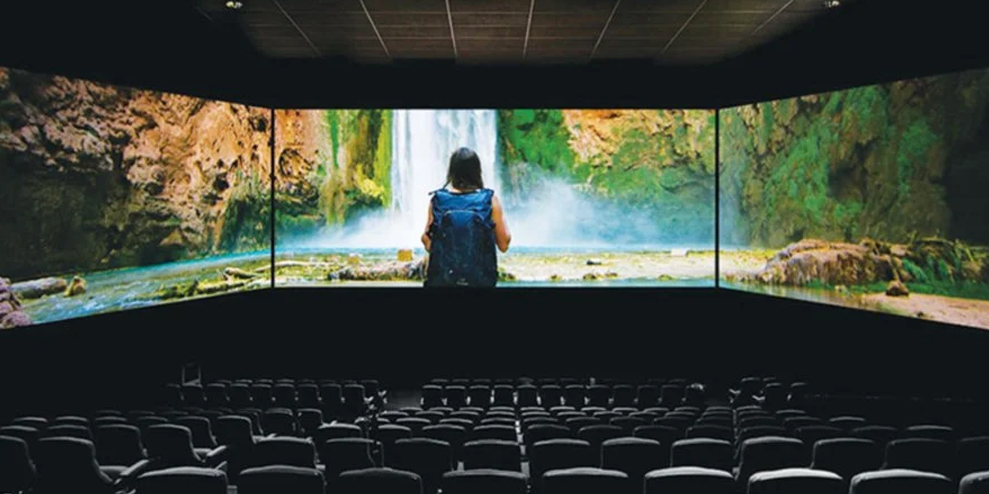Last Fall I enjoyed a great Netflix film in a somewhat unusual place — a movie theater. I saw Noah Baumbach’s “Marriage Story” in a beautiful single-screen theater in Manhattan called the Paris Theater. Then again maybe it wasn’t that unusual, since Netflix owns the theater.
I was reminded of this when WarnerMedia announced that all of 17 of their new movies next year (including titles like Dune and Wonder Woman 1984) would stream on HBO Max on the same day that they debut in theaters. A predictable freakout ensued. The end of cinema was declared.
“Some of our industry’s biggest filmmakers and most important movie stars went to bed the night before thinking they were working for the greatest movie studio and woke up to find out they were working for the worst streaming service,” said filmmaker Christopher Nolan.
“A predictable freakout ensued. The end of cinema was declared.”
That’s pretty ironic, considering the fact that Nolan’s insistence that Tenet was released in theaters in the midst of a global pandemic (and it’s unsurprisingly lame box office numbers) probably played a big role in influencing WarnerMedia’s decision to double down on their streaming strategy.
Personally, I don’t think movie theaters are going anywhere. In fact, I think this might have been the best thing to happen to movie theaters since the advent of the talkies. Why? Because it will shift them out of a ludicrously outdated business model, into all sorts of new creative opportunities. But first, they’re going to need to orient themselves around viewers, as opposed to studios. Let me explain.
Before the pandemic, the average American went to four or five movies a year. In 2019 the global box office market only increased by one percent from the previous year, and in the US and Canada, it actually declined by 5%. But according to a recent poll, the average American subscribes to at least four online video services and streams about eight hours of content a day.
It’s clear from these numbers that streaming isn’t just an ancillary revenue stream for the entertainment industry, streaming is the entertainment industry. Make no mistake, there will be no going back from this. Same-day streaming (a la carte pricing or no) will become the industry standard.
“Make no mistake, there will be no going back from this. Same-day streaming (a la carte pricing or no) will become the industry standard. ”
But wait, you’re thinking, if streaming is now the entertainment industry, then doesn’t that mean that movie theaters are doomed? Not at all! We are a social species. Movie watching is a social experience. All the major streaming services have “Netflix Party” type social extensions now (Spotify has excelled at social for years). Heck, look at the current resurgence of drive-in theaters — they’re even building new ones!
There’s nothing like watching a movie on a big screen in a dark room (or parking lot) with a great crowd. That will never change. Theaters will always own that experience. What I think will change, however, is the content we watch in those theaters.
For example, what if instead of competing against the streaming services, movie theaters worked with them? For example, popular new streaming shows like the Mandalorian, Euphoria, the Queen’s Gambit, and The Crown all have tens of millions of fans. Surely after a year of lock-down, some of those fans want to watch their favorite show on the big screen, with drinks, food, and like-minded folks?
Smaller independent theater groups like Alamo Drafthouse and Landmark have generated strong followings and thriving membership programs because they actually work a lot like Netflix; they’re a place to show up and look for interesting things to watch. In addition to first-run movies, they show sports games, live screenings of stage performances and concerts, and classics you can’t normally find on the big screen.
As Mitch Lowe, the founder of MoviePass, once noted: “You can’t just rely on two-hour slabs of studio-produced content – you should be able to go to your local cinema and watch a sporting event, or binge all Thursday on Game Of Thrones with a pass to get in and out. Attention spans are getting shorter and shorter and people are less willing to sit around for the length of your average movie.”
“There’s nothing like watching a movie on a big screen in a dark room (or parking lot) with a great crowd. ”
While the execution issues of MoviePass have been well documented, I think their vision was absolutely correct. As founder Mitch Lowe noted at our Subscribed Conference in 2018, subscription models do two things for movie watchers: they enable discovery, and they drive consumption. When you eliminate transactions and allow people to browse content, people watch more stuff. Mitch joked that MoviePass was like “bad movie insurance.” More theater chains need to think like this.
Of course, lots of theater chains have subsequently come out with their own copycat subscription programs, but they’re still essentially slaves to the studios. They’re all stuck with the same commodified product. Today it really doesn’t matter if you see something in an AMC as opposed to a Regal. But it doesn’t have to be this way.
Who knows? Next year, if we start to see more cooperation between the streaming services and theaters, we might see families might be driving to the theater for a live BTS concert, or the season finale of the Mandalorian.
Instead of taking their orders from the studios, time for theater chains to re-orient themselves around great content, no matter where it comes from. It’s time for them to subscribe.
“Instead of taking their orders from the studios, time for theater chains to re-orient themselves around great content, no matter where it comes from. It’s time for them to subscribe. ”
This article first appeared in www.subscribed.com



